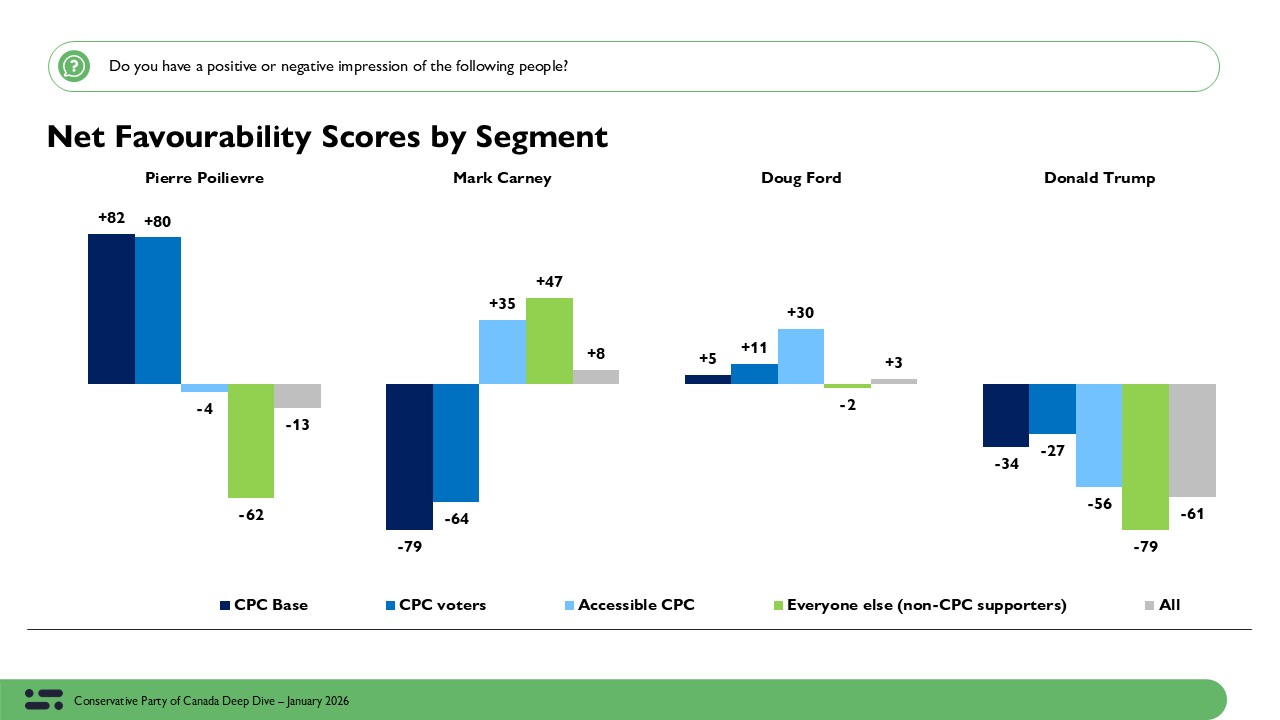Canadians’ Views on Immigration Remain Largely Unchanged from Last Year and Overly Negative
November 3, 2025
From October 24 to 29, 2025, Abacus Data conducted a national survey of 2,922 Canadian adults to explore public attitudes toward immigration and its perceived impacts.
The results show that opinions on immigration have stabilized after last year’s sharp rise in skepticism. While most Canadians continue to believe current immigration levels are too high and are contributing to pressure on housing and healthcare, the tone of concern has not deepened. If anything, the data suggest a pause in the trend toward growing negativity, as Canadians adjust to the new reality and as the federal government signals a more cautious approach.
As Ottawa prepares to unveil a new immigration plan in the upcoming budget, the findings underscore that the public remains cautious but not hardening. The political pressure is still on restraint, not expansion.
Perceptions of Immigration in Canada
Today, 49% of Canadians view immigration negatively, almost identical to the 50% recorded in November 2024. Only 26% hold positive views, while one in four (26%) are neutral. These numbers indicate that the national mood on immigration has stabilized after a year of growing concern.
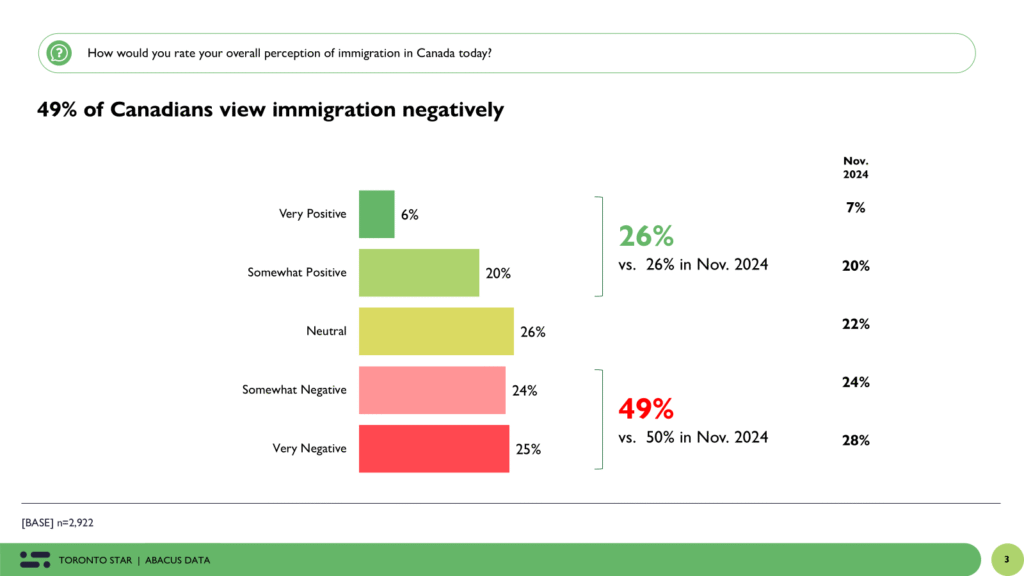
Age and political affiliation continue to shape perceptions. Younger Canadians (18-29) are far more likely to view immigration positively (36%) than those aged 45 and over (22%). Among political groups, Liberal supporters (39%) and New Democrats (26%) remain more positive, while 68% of Conservative supporters and 61% of Bloc Québécois voters view immigration negatively.
Gender gaps are modest but consistent: men (22%) are slightly more likely than women (29%) to express positive views. Regionally, concern remains highest in Prairie provinces (SK/MB 53%, AB 56%) and Quebec (49%), while Atlantic Canadians remain relatively more open.
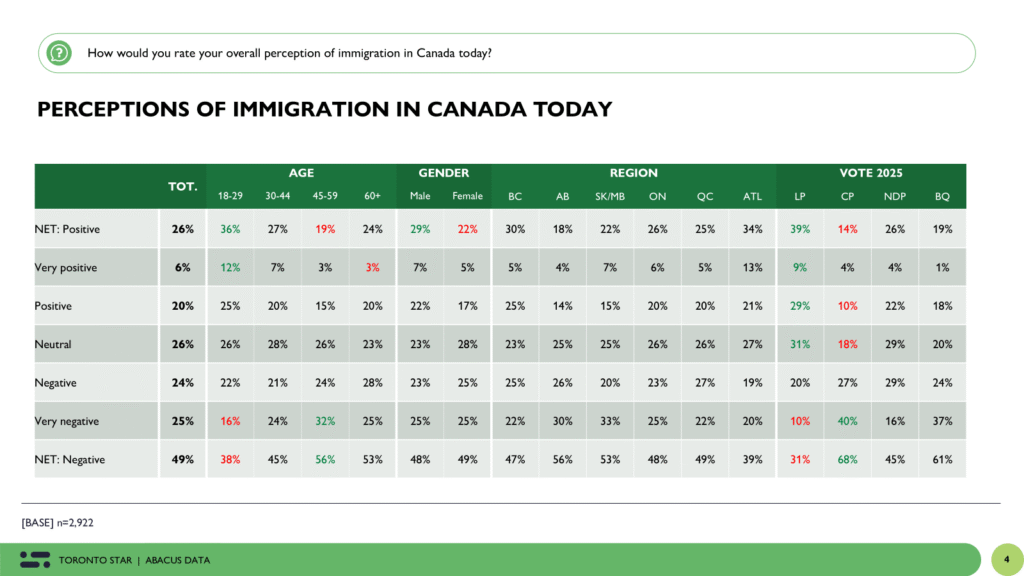
Concerns About Domestic Migration
Beyond international immigration, Canadians are also uneasy about domestic migration—the movement of people within the country. Fifty-five percent say they are concerned about its impact on their communities, consistent with 56% last year.
Concern is highest in Alberta (62%) and Quebec (57%). Younger Canadians (18-29) are nearly as concerned as older cohorts, indicating that housing stress and affordability issues transcend generations.
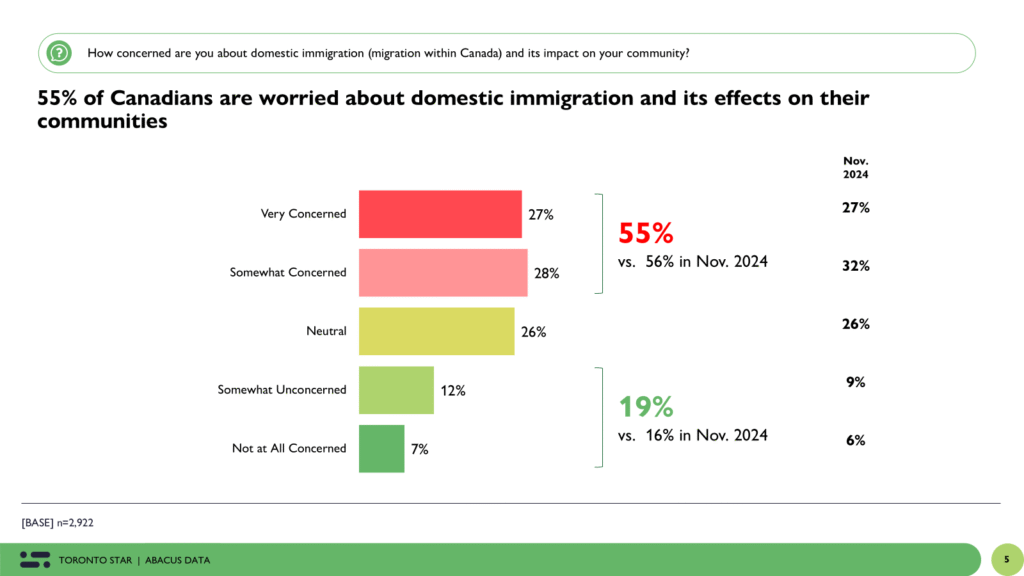
Immigration Targets: Lower Ambition, Persistent Concern
When asked about the federal government’s plan to welcome 380,000 new immigrants in 2026, a reduction from the 500,000 level tested last year, 67% still believe the number is too high, down modestly from 72% in November 2024.
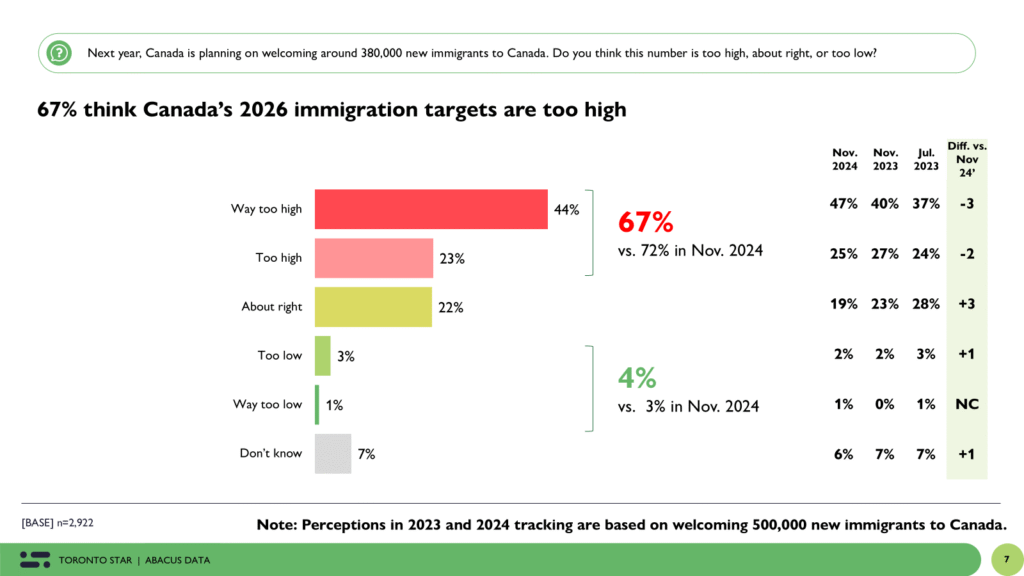
This decline suggests that lower targets have slightly softened opposition, but the majority still favour restraint. Nearly 44% say the target is “way too high,” and another 23% “too high.” Only 22% believe it’s about right.
Perceptions that the intake is excessive are strongest among Conservative supporters (79%), BQ voters (81%), and Canadians aged 45-59 (74%) and 60+ (68%). Liberal and NDP supporters are more evenly divided, though even within those groups, around half express concern.
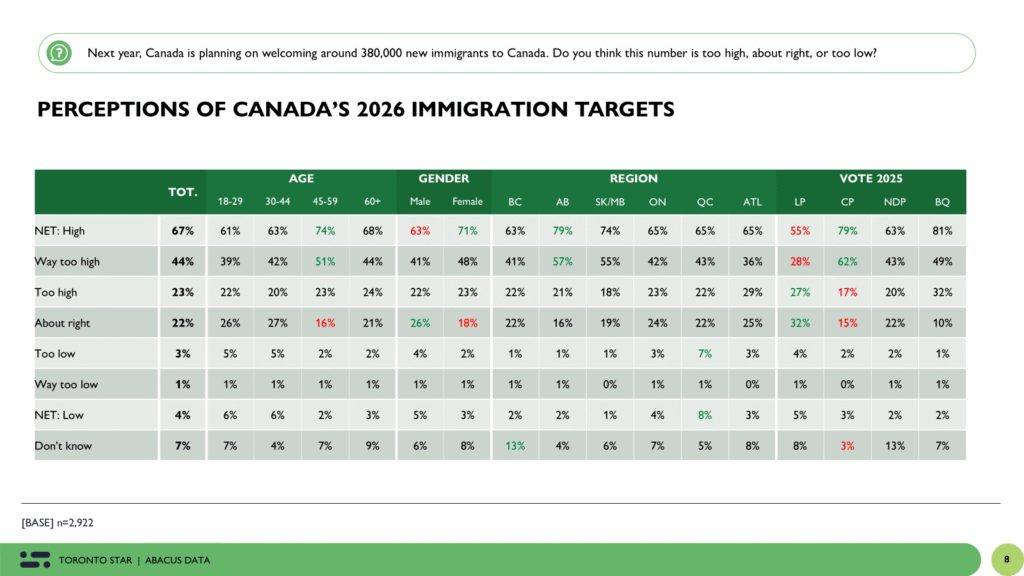
The Perceived Impact of Immigration
Majorities continue to believe immigration is worsening access to key resources:
69% say it negatively impacts the cost and availability of housing (down 4);
60% say the same about healthcare (unchanged);
58% about social services (up 1); and
60% link it to traffic and congestion (up 1).
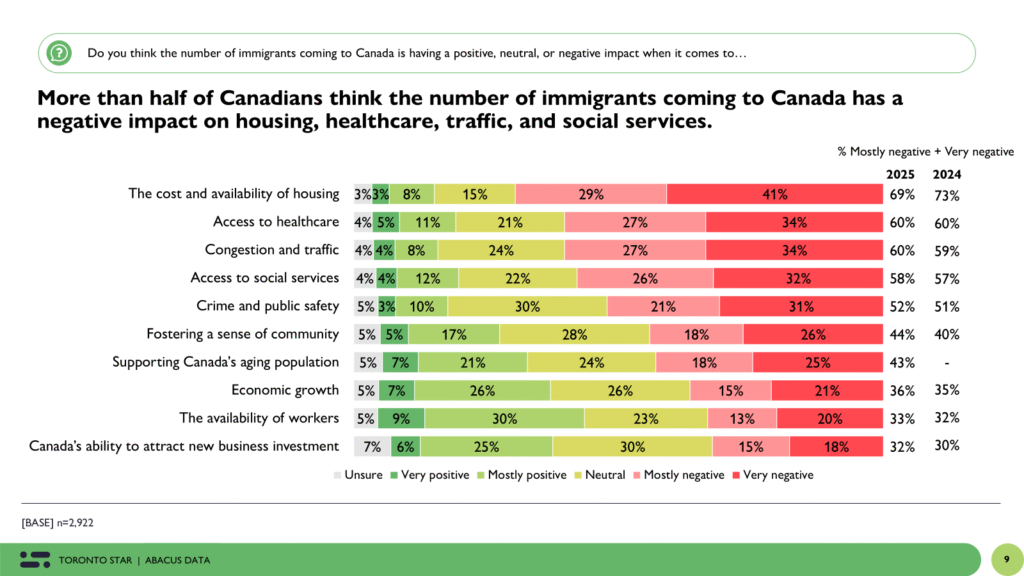
These figures are largely unchanged from 2024. The dominant narrative remains that Canada’s capacity to absorb newcomers is strained, not that Canadians oppose immigration in principle.
Interestingly, the share who say immigration is making Canada “worse off overall” has declined slightly, from 53% to 51%, while 22% believe it makes the country better off.
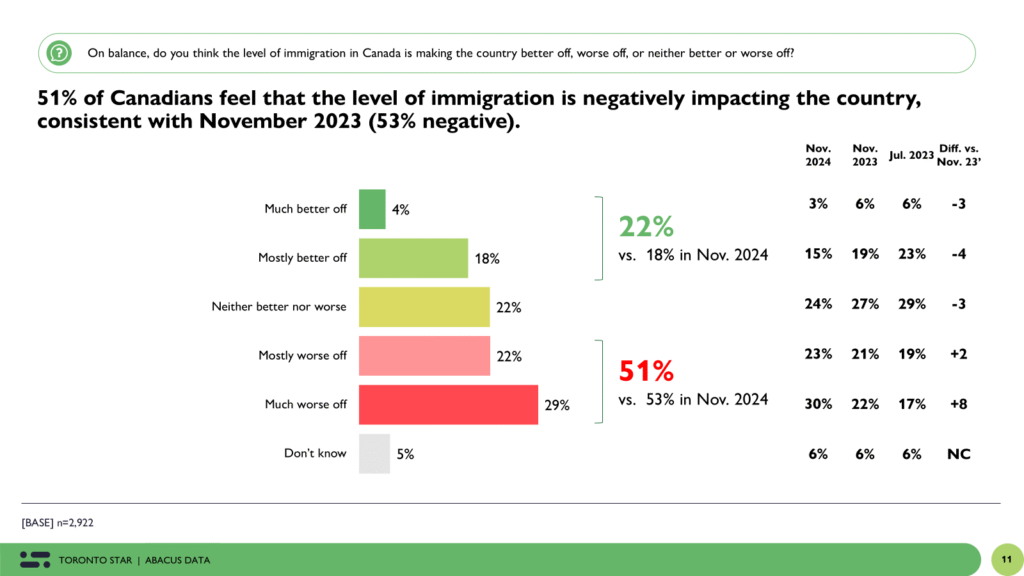
What’s Driving Concern?
When asked why the system isn’t working effectively, Canadians overwhelmingly point to structural capacity issues rather than cultural or ideological ones.
- 51% cite insufficient housing and infrastructure;
- 47% cite a strain on public services;
- 38% believe there is simply an overwhelming influx of newcomers.
These factors have remained the top drivers for two years, reflecting what we’ve called a scarcity and precarity mindset, a belief that the system is running out of space, not that people are running out of compassion.
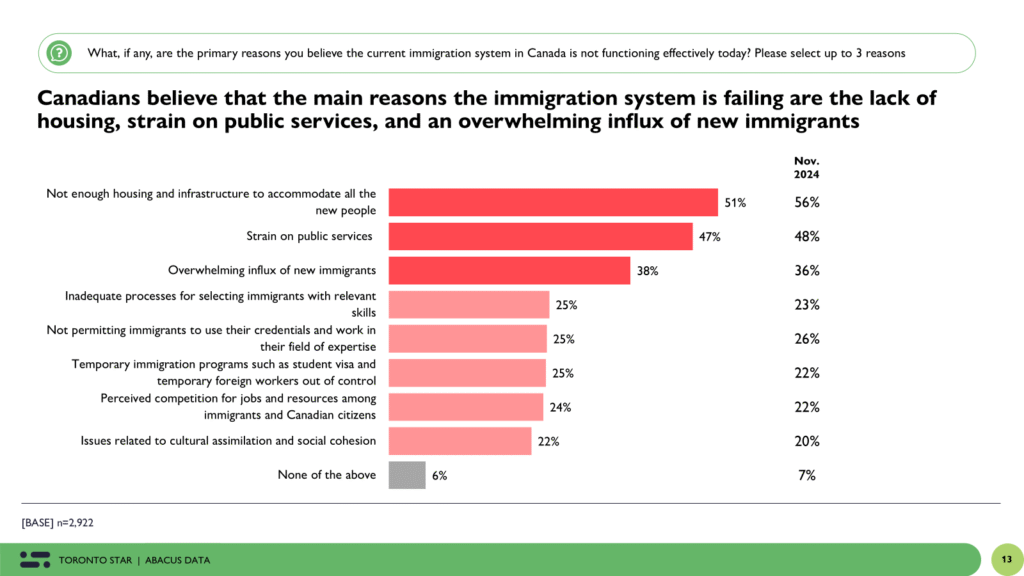
Recognized Benefits Remain Steady
Despite widespread concern, many still acknowledge immigration’s benefits:
- 35% say it helps fill gaps in the labour market,
- 26% say it contributes to economic growth, and
- 24% believe it supports an aging population.
Optimism is most evident among younger Canadians and Liberal supporters, who are more likely to view immigration as an economic and social asset. By contrast, about 30% of Canadians say they see no benefits at all, including nearly half of Conservative voters.
This divide highlights how immigration has become a political identity issue, with optimism and skepticism increasingly aligning with partisan and generational lines.
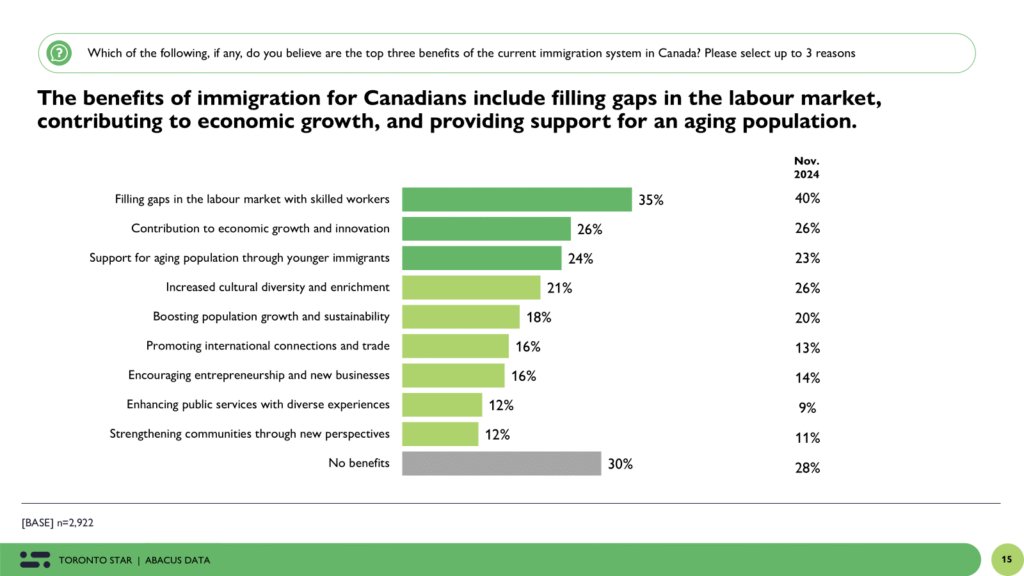
Political Leadership on Immigration
When asked which party is best equipped to manage immigration, 38% chose the Conservative Party, up four points since 2024. The Liberals rose sharply to 29% (+13), while support for the NDP fell to 7%.
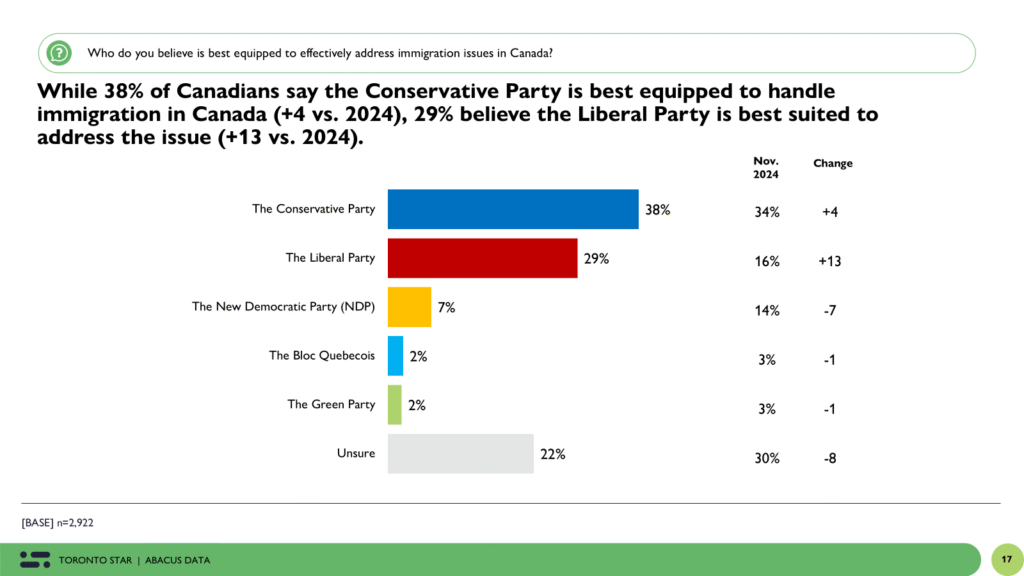
Among those with a negative view of immigration, the Conservatives dominate; among those with a positive or neutral view, the Liberals are well ahead. This polarization underscores how immigration has become a proxy issue for broader economic and competence debates.
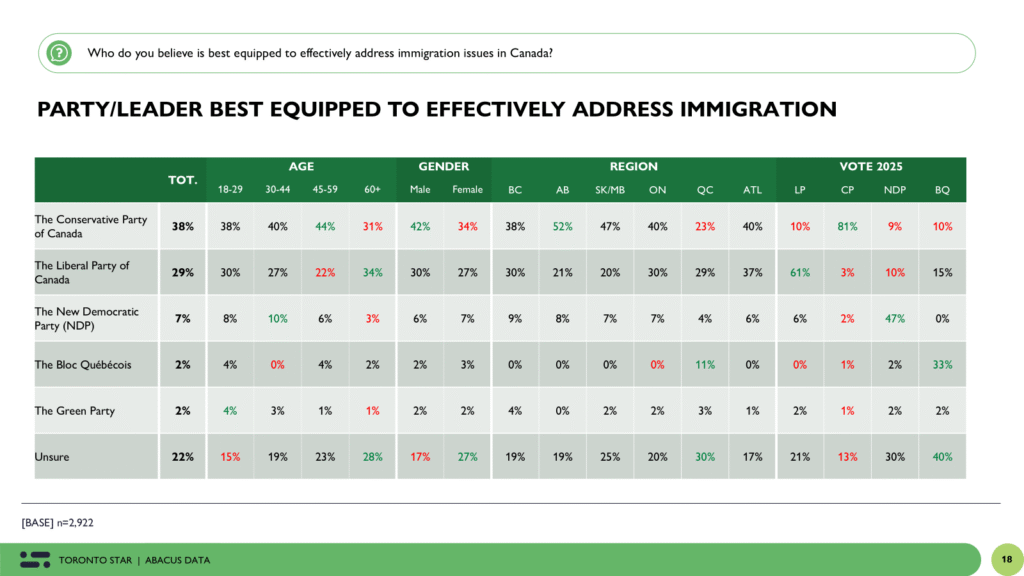
The Upshot
After years of intense discussion about housing, affordability, and healthcare, public opinion on immigration appears to have levelled off. Canadians remain skeptical but not increasingly so. The intensity of opposition has eased slightly, even as most continue to call for lower intake levels and better management.
The results suggest the public conversation is stabilizing, not escalating. Immigration remains framed less by ideology and more by perceptions of capacity, fairness, and government performance.
For policymakers, the message is clear: the public wants a system that works, not necessarily one that shrinks. But the political reality is that immigration is now closely tied to cost-of-living anxiety, and governments that appear indifferent to those pressures risk losing trust.
As the federal government prepares to set new targets in the upcoming budget, the data serve as both a warning and an opportunity. The warning: Canadians are not ready for a return to high growth without proof that housing and healthcare can keep up. The opportunity: if government can demonstrate that it is managing immigration responsibly like linking newcomers to solutions, not strain, it could begin to rebuild confidence in the system.
Methodology
The survey was conducted with 2,922 Canadians from October 24 to 29, 2025. A random sample of panelists were invited to complete the survey from a set of partner panels based on the Lucid exchange platform. These partners are typically double opt-in survey panels, blended to manage out potential skews in the data from a single source.
The margin of error for a comparable probability-based random sample of the same size is +/- 1.8%, 19 times out of 20.
The data were weighted according to census data to ensure that the sample matched Canada’s population according to age, gender, and region. Totals may not add up to 100 due to rounding.
Abacus Data follows the CRIC Public Opinion Research Standards and Disclosure Requirements that can be found here: https://canadianresearchinsightscouncil.ca/standards/
The survey was paid for by Abacus Data Inc.
About Abacus Data
We are Canada’s most sought-after, influential, and impactful polling and market research firm. We are hired by many of North America’s most respected and influential brands and organizations.
We use the latest technology, sound science, and deep experience to generate top-flight research-based advice to our clients. We offer global research capacity with a strong focus on customer service, attention to detail, and exceptional value.
And we are growing throughout all parts of Canada and the United States and have capacity for new clients who want high quality research insights with enlightened hospitality.
Our record speaks for itself: we were one of the most accurate pollsters conducting research during the 2025 Canadian election following up on our outstanding record in the 2021, 2019, 2015, and 2011 federal elections.
Contact us with any questions.
Find out more about how we can help your organization by downloading our corporate profile and service offering.




